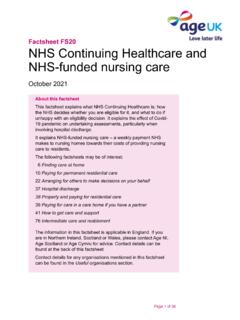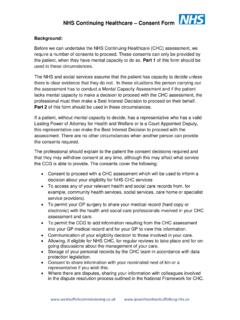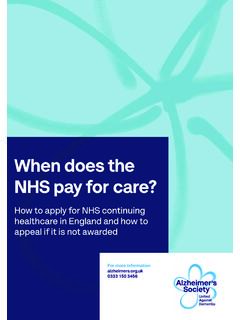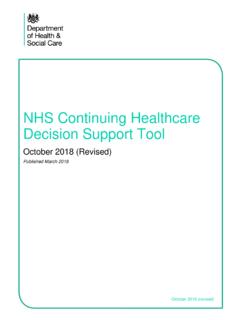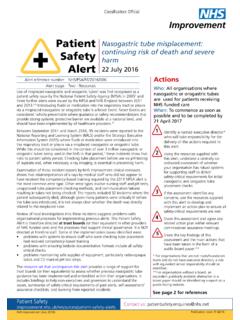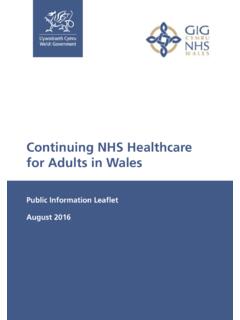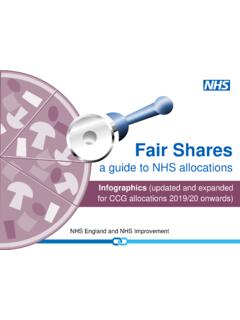Transcription of National Framework for NHS Continuing Healthcare and …
1 October 2018 (revised), published March 2018 National Framework for NHS Continuing Healthcare and NHS-funded Nursing Care October 2018 (Revised) Published March 2018 Incorporating the NHS Continuing Healthcare Practice Guidance October 2018 (revised), published March 2018 DH ID box Title: National Framework for NHS Continuing Healthcare & NHS-funded Nursing Care Author: SCLGCP-SCP 25370 Document Purpose: Guidance Publication date: March 2018 Target audience: Health and social care professionals Public Contact details: NHS Continuing Healthcare and NHS-funded Nursing Care team Department of Health and Social Care 39 Victoria Street London SW1H 0EU You may re-use the text of this document (not including logos) free of charge in any format or medium, under the terms of the Open Government Licence. To view this licence, visit Crown copyright 2016 Published to , in PDF format only.
2 3 The 2018 National Framework for NHS Continuing Healthcare and NHS-funded Nursing Care The revised 2018 National Framework sets out the principles and processes of NHS Continuing Healthcare and NHS-funded Nursing Care. This guidance replaces the previous version of the National Framework , published in November 2012, and will be implemented on 1 October 2018. It includes Practice Guidance to support staff delivering NHS Continuing Healthcare . This revised 2018 National Framework follows an extensive period of external engagement with stakeholders, across the NHS, Local Authorities, and patient representative groups. The 2018 National Framework has been collaboratively written by the Department, NHS-England and Local Authorities. In addition to the 2018 revision of the National Framework , there is also an update to the Practice Guidance and the annexes which accompany the Framework .
3 The user notes for the Checklist, Decision Support Tool and Fast Track Pathway Tool have been updated, alongside some minor clarifications to the domain wordings and descriptors. The updated National Tools should be used from 1st October 2018 alongside the updated National Framework . The 2018 National Framework is intended to: 1) provide greater clarity to individuals and staff, through a new structure and style 2) reflect legislative changes since the 2012 National Framework was published, primarily to reflect the implementation of the Care Act 2014, 3) clarify a number of policy areas, including: a) Setting out that the majority of NHS Continuing Healthcare assessments should take place outside of acute hospital settings. This will support accurate assessments of need and reduce unnecessary stays in hospital.
4 B) Providing additional advice for staff on when individuals do and do not need to be screened for NHS Continuing Healthcare in order to reduce unnecessary assessment processes and respond to a call for greater clarity on this. c) Clarifying that the main purpose of three and 12 month reviews is to review the appropriateness of the care package, rather than reassess eligibility. This should reduce unnecessary re-assessments. d) Introducing new principles for CCGs regarding the local resolution process for situations where individuals request a review of an eligibility decision. The aim is to resolve such situations earlier and more consistently. e) Providing clearer guidance, including dedicated sections, on: the roles of CCGs and local authorities, NHS-funded Nursing Care, inter-agency disputes, well-managed needs, and the Fast Track Pathway Tool.
5 Importantly, none of the 2018 amendments and clarifications to the National Framework , Practice Guidance, annexes or National Tools are intended to change the eligibility criteria for NHS Continuing Healthcare . All those involved in the delivery of NHS Continuing Healthcare should become familiar with the whole National Framework , Practice Guidance, annexes and National Tools and should align their practice accordingly. 4 Contents Context and purpose Executive summary .. 6 Introduction .. 8 Leadership and governance .. 10 Legal context .. 14 Key concepts in NHS Continuing Healthcare Primary health need .. 19 Before an assessment of eligibility for NHS Continuing Healthcare Core values and principles .. 22 Consent .. 24 Capacity .. 26 Assessment of eligibility for NHS Continuing Healthcare Screening for NHS Continuing Healthcare using the Checklist tool.
6 29 When and where to screen and assess eligibility for NHS Continuing Healthcare .. 34 Assessment of eligibility for NHS Continuing Healthcare using the Decision Support Tool .. 38 Decision-making on eligibility for NHS Continuing Healthcare by the CCG .. 45 After an assessment of eligibility for NHS Continuing Healthcare Care planning and delivery .. 48 NHS Continuing Healthcare Reviews (at three and 12 months) .. 52 Individual Requests for a Review of an Eligibility Decision .. 55 Inter-agency disputes .. 59 Fast track Fast track .. 63 5 Other pathways Joint packages of care, including NHS-funded Nursing Care .. 69 Additional considerations Further information related to care and support arrangements .. 74 Advocacy .. 82 Mental health 83 Carers .. 86 Transition from child to adult services .. 88 Practice Guidance Practice Guidance.
7 92 Annexes Annex A: Glossary .. 147 Annex B: The Coughlan Judgment .. 152 Annex C: The Grogan Judgment .. 154 Annex D: Independent Review Panel Procedures .. 155 Annex E: Guidance on responsibilities when a decision on NHS Continuing Healthcare eligibility is awaited or is disputed .. 159 Annex F: Local NHS Continuing Healthcare Protocols .. 164 National Framework for NHS Continuing Healthcare and NHS-funded Nursing Care 6 Executive summary 1. This revised National Framework sets out the principles and processes of NHS Continuing Healthcare and NHS-funded Nursing Care. 2. This guidance replaces the previous version of the National Framework , published in November 2012 and will be implemented on 1 October 2018. It includes Practice Guidance to support staff delivering NHS Continuing Healthcare . 3. At the heart of the National Framework is the process for determining whether an individual is eligible for NHS Continuing Healthcare or NHS-funded Nursing Care.
8 4. An individual is eligible for NHS Continuing Healthcare if they have a primary health need . This is a concept developed by the Secretary of State to assist in determining when the NHS is responsible for providing for all of the individual s assessed health and associated social care needs. 5. In order to determine whether an individual has a primary health need, a detailed assessment and decision-making process must be followed, as set out in this National Framework . Where an individual has a primary health need and is therefore eligible for NHS Continuing Healthcare , the NHS is responsible for commissioning a care package that meets the individual s health and associated social care needs. 6. This National Framework is underpinned by Standing Rules Regulations1, issued under the National Health Service Act 20062.
9 These regulations, referred to henceforth as the Standing Rules, require Clinical Commissioning Groups (CCGs) to have regard to the National Framework . 7. This revised National Framework takes account of legislative changes brought about by the Care Act 20143, which preserves the existing boundary and limits of local authority responsibility in relation to the provision of nursing and/or Healthcare . 8. The individual, the effect their needs have on them, and the ways in which they would prefer to be supported should be kept at the heart of the process. Access to assessment, care provision and support should be fair, consistent and free from discrimination. 1 The National Health Service Commissioning Board and Clinical Groups (Responsibilities and Standing Rules) Regulations 2012 2 National Health Service Act 2006 3 Section 22 of the Care Act 2014 National Framework for NHS Continuing Healthcare and NHS-funded Nursing Care 7 9.
10 CCGs, the National Health Service Commissioning Board (referred to throughout this National Framework as NHS England) and local authorities have legal duties and responsibilities in relation to NHS Continuing Healthcare . 10. Those eligible for NHS Continuing Healthcare continue to be entitled to access the full range of primary, community, secondary and other health services. Key Definitions NHS Continuing Healthcare means a package of ongoing care that is arranged and funded solely by the National Health Service (NHS) where the individual has been assessed and found to have a primary health need as set out in this National Framework . Such care is provided to an individual aged 18 or over, to meet health and associated social care needs that have arisen as a result of disability, accident or illness. The actual services provided as part of the package should be seen in the wider context of best practice and service development for each client group.










